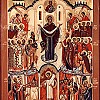The Good, the Bad, and the Harmonious
A traditional Chinese tale recounts the mishaps and hidden blessings in the life of a man called Old Sai. It seems that Old Sai had only one horse, which ran away one day. Old Sai’s neighbors felt sorry for him, but he only said, “maybe it’s not such a bad thing.” Sure enough, Old Sai’s horse returned, bringing another horse with it. When his neighbors congratulated him, wise old Sai responded, “maybe it’s not such a good thing.” Later, while riding the new horse, Old Sai’s son fell and broke his leg, ending up crippled. Again, when his neighbors came to commiserate with him, Sai said, “maybe it’s not such a bad thing.” Not long thereafter, war broke out. Because of his disability, Sai’s son was spared from having to go fight. While the other young men in their village died in battle, Old Sai’s son survived.
Though the world may hear such a tale and conclude that there is no sense in declaring anything good or bad, a more Christian response would be to say that while, on the one hand, God has indicated both what is good (all of His creation, and the right use of it), and what is evil (the misuse of His creation), on the other hand, none of us can see the whole picture of things, as He can. In other words, we see only a few pieces of the puzzle, while He, being omniscient, sees it all laid out across the floor of the universe. This is a humbling realization, and should inspire in us both awe before God’s perfect knowledge and a healthy distrust of our own ideas.
This healthy distrust, though, is very different from a popular attitude we could call moral agnosticism, which says, “Since we can’t really know for sure what the outcome of any action will be, then it’s anybody’s guess whether an action is good or bad.” In other words, knowing that God’s will is enshrouded in mystery, we throw up our hands and decide that it makes little difference what we do. It seems that this line of thinking is sometimes used to justify moral relativism – I decide what’s right for me, and you decide what’s right for you, and neither of us can judge the other's actions. However, while we’re certainly not to judge another person’s spiritual standing before God, since only He knows their heart, it is not really the case that we have no objective information about whether an action is good or evil, in and of itself. For example, murder and adultery are categorically denounced by Scripture, and throughout the Church’s tradition. That is, the Body of Christ has received, and preserved, a revelation of God’s will concerning these particular matters. God’s people are by no means to consider murder or adultery to be good, or permissible, things.
Is it nevertheless possible for God, who is almighty and able to see all of reality at once, to use a particular instance of murder or adultery for the ultimate good? Certainly; He is in the business of taking our broken reality and transforming it. As an example, we might consider the case of the King and Prophet, David. David committed adultery with Bathsheba, and then ordered the death of her husband. Yet, God used these profane acts to bring David to greater depths of repentance and humility than he had previously known, and out of those depths came the Church’s greatly beloved Psalm 50 (51): “Have mercy on me, O God…”. At the same time, it must not be forgotten that it was precisely David’s repentance that opened him up to becoming, once again, God’s instrument. Nor did the Lord’s redemption of the situation change the fact that murder and adultery are condemned. By “condemned” we should understand that there is a flashing warning sign standing at the edge of a cliff – if we choose to go that way, we will fall into the abyss.
The fallacy made by those who hear of cases like Prophet David’s, and who conclude that our actions are therefore ultimately neither good nor bad, is to confuse two separate issues. The first issue is with our intentions: every action is done with good or bad intentions on our part. While our motives are often mixed, and may not be completely clear to an outsider, we nevertheless have to choose at every moment to act either according to love, as commanded by God, or against love. If we choose to act against love, we are choosing to sin, for sin is precisely the choice that is against love – and ultimately against God, who is love. The second issue, not to be confused with the first, has to do with God’s omnipotence. Besides knowing all things, the Lord can do all things. That is, He is able even to pick up the shattered pieces of our lives after we make the wrong choices, and to reshape them into something beautiful and good.
But that magnificent and limitless creative power on God’s part in no way removes our responsibility to act in accordance with His will, as far as that has been revealed to us. While we may not have a manual that tells us in every instance exactly what to think, say or do, that is not really necessary. If we make use of the rich treasury of God’s will as revealed to the Church in the Scriptures, the Fathers, the lives of the Saints, and the whole of the Church’s tradition, we have a pretty good idea of what it means to act in cooperation with God’s will. Besides, we have a conscience, which, informed by that tradition, teaches us to “walk in love.” When we thus act, we are like members of an orchestra, creating an exquisite symphony with the Lord. While the Lord, as the Divine conductor, is able to work around renegade musicians who choose to ignore His direction, He would prefer that we become co-musicians with Him. Our Father desires that we be mature sons and daughters, no longer straining and struggling against His wise purposes as we did in our infancy, but freely acting in reverberating harmony with Him. Because our understanding continues to fall short of His, however, preserving this harmony will sometimes mean reserving judgment of His purposes (like Old Sai) and putting all our faith in the goodness of His love, and in His mercy, “which endureth forever.”
|
| |||||||||||||


 Find us on Facebook
Find us on Facebook Orthodoxy in America
Orthodoxy in America



